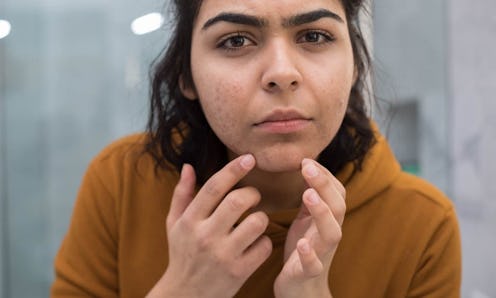Life
A Study Just Linked Having Acne With Depression — Here's What You Need To Know

Acne can suck. As someone who has had acne for years and has the scars to prove it, I’m speaking from first-hand experience. If you’ve ever had acne, you may be familiar with the some of the side effects associated with the skin condition; itching, redness, and swelling are some common ones. But a new study has found that acne is also associated with an increased risk of depression.
Isabelle A. Vallerand, an epidemiologist at the University of Calgary in Alberta, Canada and the study’s lead author, said, according to reporting from Metro, “It appears that acne is a lot more than just skin deep. It can have a substantial impact on overall mental health.”
The study, which was published in The British Journal of Dermatology, analyzed data from a large primary care database in the United Kingdom called The Health Improvement Network (THIN). The data dated back to 1986, with the most recent data being from 2012. To be clear, researchers in this study only analyzed the association between acne and depression in people who had been diagnosed with acne in the United Kingdom, so they weren’t surveying people who happened to have a pimple or two.
Researchers were able to follow 134,427 people with acne and 1,731,608 without acne for 15 years, according to the New York Times. Participants ranged in age from seven to 50. From the patient data, researchers found that the probability of someone diagnosed with acne developing major depression was 18.5 percent. People without an acne diagnosis were less likely to have major depression — they had a 12 percent chance of developing it.
According to the results of this study, people with acne were more likely to be young, non-smoking females from a higher socioeconomic status. People with acne were also less likely to drink alcohol or have high BMIs, according to the study.
After controlling for these factors, researchers were able to determine that while the risk of developing major depression was significantly higher for people with acne, that was only the case within the first five years of diagnosis, with the highest risk being within the first year (63 percent).
"This study highlights an important link between skin disease and mental illness. Given the risk of depression was highest in the period right after the first time a patient presented to a physician for acne concerns, it shows just how impactful our skin can be towards our overall mental health," Vallerand said in a press release. "For these patients with acne, it is more than a skin blemish — it can impose significant mental health concerns and should be taken seriously."
A lot of doctors will have their patients fill out forms about their complete medical history, so if a dermatologist asks you whether you’ve been feeling depressed or anxious within the last 12 months, it’s important to be honest even if you can’t immediately recognize the relevancy of their questions. Checking in with your emotions and relaying them to trusted medical professionals may help in the depression screening process.
More research needs to be done to determine the exact association between acne and major depression, but what is clear is that the different systems in your body impact one another. Just like how the food you consume can cause acne to appear, acne can also negatively impact your mental and emotional health. Not to mention that impossible beauty standards put a lot of pressure on people (especially women) to have flawless skin. Next time you’re at a specialist, don’t be afraid to mention what is going on with the other parts of your body. They could have some professional medical insights that can improve your overall health.